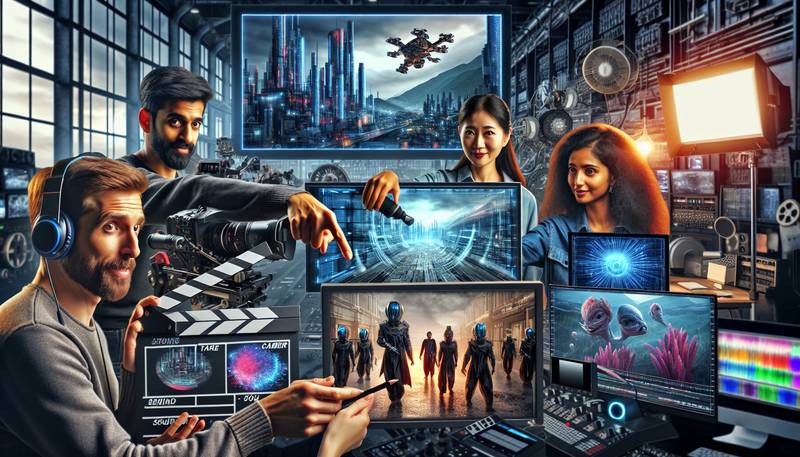Tech in Filmmaking: How Digital is Shaping the Movies

The Evolution of Digital Filmmaking
Once upon a time, filmmaking was an art form that required a significant amount of physical labor. From loading and unloading film reels to splicing and editing celluloid, the process was time-consuming and required a high level of skill. Fast forward to the digital age, and the landscape of filmmaking has changed dramatically. Digital technology has revolutionized the industry, allowing filmmakers to create and edit their work with greater ease and efficiency. Today, digital filmmaking is the norm, and the technology continues to evolve at a rapid pace.
The Impact of Digital Cameras
One of the most significant changes in the industry has been the advent of digital cameras. These cameras have made it possible for filmmakers to capture high-quality images with greater flexibility and creativity. The ability to immediately review footage on-set has also been a game-changer, allowing directors to make adjustments on the fly and ensuring that the final product is as close to their vision as possible. Additionally, digital cameras have made it possible for independent filmmakers to create professional-looking films on a budget, democratizing the industry and giving rise to a new generation of talented directors.
The Role of Computer-Generated Imagery (CGI)
Computer-generated imagery (CGI) has also played a significant role in the transformation of filmmaking. CGI has made it possible for filmmakers to create realistic and fantastical worlds that were once impossible to achieve. From the dinosaurs in "Jurassic Park" to the epic battles in "The Lord of the Rings," CGI has allowed filmmakers to push the boundaries of what is possible on-screen. With advances in computer processing power and software, the possibilities for CGI continue to grow, making it an essential tool for modern filmmakers.
Editing and Post-Production in the Digital Age
The digital revolution has also had a significant impact on the editing and post-production process. Digital editing software has made it possible for filmmakers to edit their films with greater precision and speed. The ability to easily add visual effects, color correct, and manipulate sound has given filmmakers more control over the final product. Digital distribution has also made it easier for filmmakers to reach wider audiences, as films can now be distributed online and through streaming services.
The Future of Digital Filmmaking
As technology continues to advance, the future of digital filmmaking looks bright. Virtual reality and augmented reality are already being incorporated into the filmmaking process, allowing filmmakers to create even more immersive experiences for audiences. Artificial intelligence is also beginning to play a role in the industry, with algorithms being used to analyze scripts, predict box office success, and even generate new content. As the lines between technology and filmmaking continue to blur, the possibilities for what can be achieved on-screen are limitless.
The Challenges of Digital Filmmaking
While digital technology has brought many benefits to the filmmaking industry, it has also presented new challenges. The ease of access to digital cameras and editing software means that there is now a glut of content, making it difficult for filmmakers to stand out in a crowded market. Additionally, the rapid pace of technological change means that filmmakers must constantly adapt and learn new skills to stay relevant. The industry is also grappling with issues of piracy and the impact of streaming services on traditional distribution models.
Conclusion
It is clear that digital technology has had a profound impact on the filmmaking industry. From the way films are shot and edited to the way they are distributed and consumed, digital has changed the game. As technology continues to evolve, it will be exciting to see how filmmakers adapt and what new stories they will be able to tell. One thing is for sure: Digital is here to stay, and it will continue to shape the movies for years to come.


